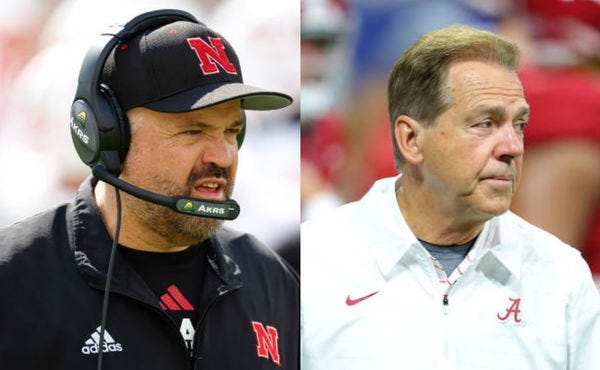Introducing Sports Talk: Accessible Mentoring, Leadership & Strategy Examples
Matt Rhule, Nick Saban, and other coaches will be on display as we examine leadership, strategy, and tactics in communication, buy-in, and leading a team through adversity to high performance.

One of the challenges of having conversations in the space we’re interested in is creating accessible, tangible instances and frames of reference for what we’re aiming to talk about. Enter, Sports Talk. Sports often (but not always) holds a unique forum for discussion about achievement, success, effort, and building towards something - maybe even something that has never existed before.
Now, you may hear certain coaches opine that each year you are truly innovating, as the roster and the opportunities are unique - and I would not offer much disagreement about that. But I am particularly interested in some of the developmental aspects of this process. To that end, I may particularly center on a few select coaches, and even more, within college athletics - or what is currently known as collegiate, NCAA football, in particular. (I say this as college athletics appears on the brink of unprecedented changes in its funding, structure, and potential shift away from amateur to professional minor league type of operations).
Indeed, this may be a somewhat serviceable analogy for the chaos and uncharted territories of technology development, legislation, and otherwise uncertain regulatory and economic futures of “innovation space” at large.
Even if not, I hope that profiling and detailing some of the strategy, tactics, and overall manners of handling business and development of teams will carry substance. No less, fewer NDAs and proprietary information or experiences to skirt around, as well.
A primer on Husker History
In this brief post here announcing this category, I will out my biases: I am a longtime Nebraska Cornhuskers fan. To those lacking context, let me breifly state the following:
The program was once a model of sustained excellence, built on a foundation of strong leadership, disciplined culture, and innovation. From the 1960s through the early 2000s, under legendary coaches like Bob Devaney and Tom Osborne, Nebraska became a national powerhouse—earning five national championships and decades of dominance, including a 35-year streak of bowl appearances and sellout home crowds.
This success was rooted not just in talent, but in organizational consistency, player development, and a clear identity. But in the 2000s, after Osborne's retirement, the program entered a leadership vacuum. Frequent coaching changes, shifting systems, and unclear direction from the top of the university led to a crisis of identity. What followed was nearly two decades of instability, inconsistent results, and diminished national relevance, despite strong fan support and resources: in the last 10 years, Nebraska only had 2 winning, sometimes only winning 3 or 4 games out of 12.
They had coaching regimes that contained: a very lax coach who followed a very angry coach; failed Hometown Hero; and now a new sense of hope with someone more embracing of the challenges and adept at both communication and strategic choices. Will he “win” at Nebraska? We’ll see, but they are in better shape to do so than most of the seasons in recent history.
From a leadership perspective, Nebraska’s fall isn’t about effort or tradition—it’s about what happens when long-term vision and cultural alignment fracture, and leadership fails to adapt without losing the core values that made it great. What’s more, Nebraska’s sports media offers a unique and daunting fishbowl, with high pressure, intense questions, and local interest that outweighs many professional teams’ scrutiny, intensity, and (over)-analyses.
I will focus on Matt Rhule, current Nebraska Football Head Coach, alongside like Nick Saban and others who offer useful teaching moments and examples for how to lead teams through challenging times, and instill buy-in in the face of adversity.
Why Sports Talk? Why Now?
This series will not be about glorifying sports culture for its own sake, nor about drawing false equivalence between athletic coaching and organizational management. But within the high-visibility, feedback-rich, and often brutal environments — we find living case studies in momentum, morale, missteps, and meaning-making. That’s precisely what From Here to There is interested in.
Leadership under ambiguity. Systems-building amidst change. Cultivating buy-in under pressure. These are the crucibles in which resilient teams are forged — in business, in research, and on the field.
Future entries will draw on real-world coaching narratives, tactical decisions, and culture-setting efforts to offer lessons applicable well beyond the stadium. Stay tuned — and if you have a favorite leadership or strategic communications moment from sports, I’d love to hear it.
Cheers,
More from our Sports Talk series.



